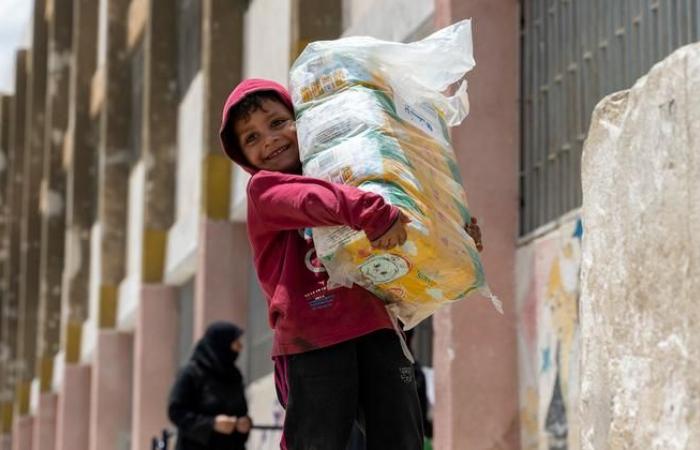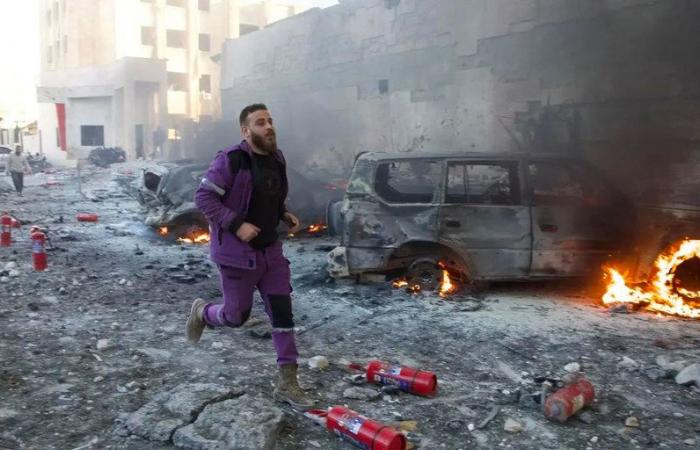In its latest report on the situation in Syria, the UN Office for the Coordination of Humanitarian Affairs (OCHA) notes that the fighting and instability are having “serious economic consequences”.
Price increases of other products have been reported in markets across the country, with the price of chicken increasing by 119%, seriously affecting people’s access to basic food. Generally speaking, prices increased between November 27 and December 9 by 18-90% in all markets.
However, on the ground, ongoing hostilities are limiting humanitarian access – particularly in Quneitra, Menbij and Deir ez-Zor – hampering efforts to distribute food aid and farmers’ access to their land while the season wheat sowing begins.
Additionally, the extreme fluctuation in exchange rates has also led to economic instability, causing stores to close and merchants to hoard products.
© UNICEF/Muhannad Aldhaher
A girl who fled escalating violence in Aleppo with her family arrives at a reception center in the town of Ar-Raqqa, Syria.
Limited access to nutrition services in the northeast
In this climate of uncertainty, most nutrition interventions, including nutritional surveillance centers, which operate under the auspices of the Ministry of Health, are still suspended. Many health and nutrition workers have moved to other governorates due to insecurity, according to OCHA, which adds that access to nutrition services in northeastern Syria remains limited due to ongoing hostilities, curfews and fuel shortages.
Nutrition services in Ar-Raqqa have been suspended since December 8. Three mobile clinics in Deir ez-Zor and two nutrition centers in Menbij are closed.
“Stocks of preventive nutritional products are insufficient in all regions of Syria,” underlines OCHA, noting that UNICEF’s stock of preventive and curative supplies is only sufficient until March 2025 in the northwest of Syria.
Faced with this situation of shortages observed in several Syrian localities, more than 590,000 people in the northwest of the country received bread, hot meals, ready-to-eat rations and other forms of food aid between November 27 and December 12. A rapid needs assessment is underway in western Aleppo and Idlib to adjust the food assistance strategy.
According to OCHA, instability has hampered the response in northeast Syria, but partners continue to provide assistance through multiple modalities, including hot meals and dry food rations.
Cases of “significant psychological distress”
Furthermore, Syrian hospitals are “overwhelmed by the high number of trauma cases [psychologiques] “. “Health partners reported significant psychological distress among civilians, with signs of trauma particularly pronounced among children,” OCHA said. “Health needs in northeast Syria are particularly acute following recent violence.”
In the eastern city of Deir ez-Zor, seven of eight primary health care centers have been “rendered non-functional” as hospitals face significant shortages of staff, electricity and fuel. “Nine health facilities, including seven primary health centers and one hospital, were vandalized and looted in Menbij,” OCHA said, adding that funding was urgently needed to support the health system.
A total of 140 health facilities in northwest Syria are facing a severe shortage of funds, including hospitals, blood banks and dialysis centers.
More broadly, the security and humanitarian situation in Syria remains volatile and dynamic a few days after the collapse of the Assad regime on December 8.
© UNOCHA/Ali Haj Suleiman
A rescuer rushes after a bombing in Idlib, Syria (file photo).
Resumption of humanitarian activities when security permits
As populations continue to move, humanitarian partners are sounding the alarm about high levels of contamination from explosive devices. At least 52 minefields of varying sizes have been identified over the past 10 days and marked between Aleppo and Idlib, restricting the movement of civilians and preventing the delivery of goods and services.
Despite the difficulties and instability, UN agencies and their partners continue their activities when security conditions allow. All NGOs and health facilities that had suspended their activities in Idlib and northern Aleppo due to the fighting have now returned to normal.
The cross-border operation from Türkiye continues without hindrance. On December 10, 25 trucks carrying UN aid crossed the border into northwest Syria. Nine trucks carrying 219 tonnes of food baskets from the World Food Program (WFP) crossed the Bab Al-Salam border post, while 16 humanitarian trucks crossed Bab Al-Hawa.
However, humanitarian activities in northeast Syria remain largely limited due to insecurity. NGOs in Menbij remain closed, leading to the suspension of water and sanitation (WASH) services in the Menbij camp, which houses nearly 16,000 internally displaced people. “Health activities in all health facilities supported by NGOs also remained suspended due to reports of looting,” OCHA said.







